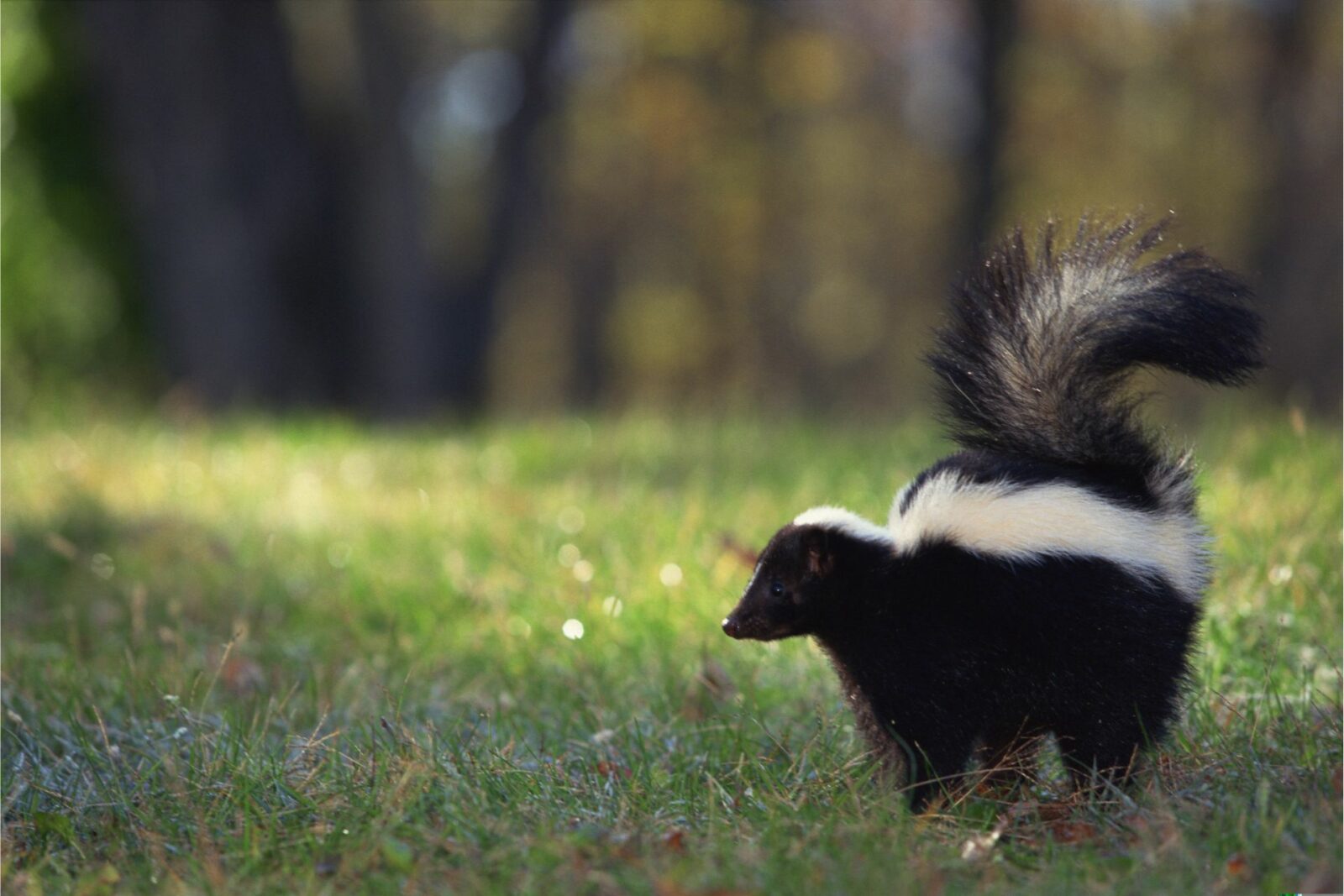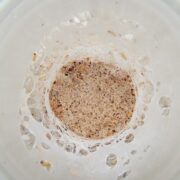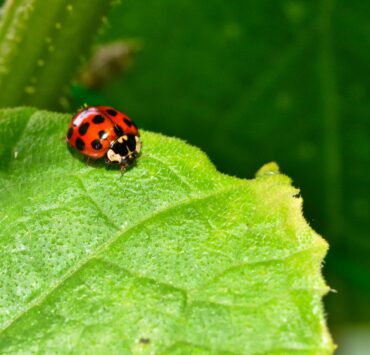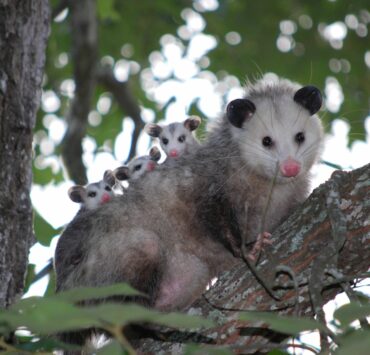Skunks are nocturnal creatures known for their notorious and odorous defensive spray. If you find that you have them on your property, know that apart from the stench of their spray, they carry disease and can cause property damage. Altough cute, it’s in your best interest to keep skunks away from your house. To do so, there are several steps you can employ to get rid of and repel skunks from your home.
1. Remove Food Sources
Skunks are attracted to easily accessible food sources, so make sure to:
- Secure your garbage: Use heavy-duty garbage cans with tight-fitting lids and place a cinder block or other heavy object on top if necessary.
- Pick up pet food: Don’t leave pet food outside overnight, as this is an easy meal for skunks.
- Harvest fruits and vegetables: Skunks love ripe produce, so promptly harvest your fruits and vegetables.
- Clean up birdseed: If you have bird feeders, ensure that you clean up any spilled seed regularly.
2. Install Lights
Skunks are nocturnal and typically avoid bright areas. Illuminate your yard with motion-activated lights to deter them. Solar-powered lights are an energy-efficient option for this purpose.
3. Use Skunk Repellents
There are several repellants you can use to keep skunks away:
- Ammonia-soaked rags: Skunks dislike the strong smell of ammonia. Place ammonia-soaked rags around your property, but be cautious of its use around children and pets.
- Commercial repellants: There are many commercial skunk repellents available, which can be applied to the perimeter of your property to keep skunks at bay.
- Cayenne pepper: Sprinkle cayenne pepper around potential entry points to deter skunks from entering your property. Reapply after rain or watering your garden.
4. Relocate Skunks
If skunks have already made their way onto your property, consider relocating them:
- Live traps: Use live traps baited with peanut butter or marshmallows to humanely capture the skunks. Check with your local wildlife control agency for guidance on relocating them.
- Professional assistance: If you’re unsure of how to proceed, hire a professional wildlife removal service to handle the situation.
5. Understand What Attracts Skunks
By understanding what attracts skunks, you can better prevent them from coming to your property. Here are some more details about factors that can make your property appealing to skunks:
- Shelter: Skunks are attracted to dark, enclosed spaces for shelter. Seal off crawl spaces, decks, and sheds to prevent them from finding a home on your property. Ensure you secure and cover woodpiles, as they can be enticing hiding spots for skunks. Install wire mesh or lattice around the base of structures to keep skunks from gaining access.
- Insects and grubs: Skunks are insectivores, and they love digging for grubs. Regularly treating your lawn for grubs can help deter skunks. In addition to grubs, skunks will also dig for other insects, such as ants and beetles. Maintaining a healthy and well-aerated lawn can reduce the number of insects available, making your yard less attractive to skunks.
- Water sources: Skunks need water to survive, so eliminate standing water and fix any leaks around your home. Bird baths, pet water bowls, and even dripping outdoor faucets can attract skunks in search of a drink. Regularly check your property for any unintentional water sources and promptly address them.
6. Skunk Warning Signs to Heed
Be aware of these warning signs that a skunk might be nearby, and take action to prevent them from establishing a home on your property:
- Odor: A faint skunk smell could indicate that a skunk is in the area. The presence of this odor over a prolonged period may signal that a skunk has taken up residence nearby. Regularly inspect your property for any signs of skunk habitation and take appropriate action to remove them.
- Tracks: Skunk tracks are similar to cat tracks but have five toes and visible claws. Look for these tracks near potential food sources, water sources, or shelter areas on your property. If you see tracks, consider setting up a wildlife camera to confirm the presence of skunks and monitor their activity.
- Digging: Skunks dig cone-shaped holes in lawns when searching for insects and grubs. If you notice these types of holes, it’s a sign that skunks are searching for food on your property. This should prompt you to take action, such as treating your lawn for insects or implementing skunk deterrents.
7. Neutralizing Skunk Odors
In the unfortunate event that a skunk sprays near your home or on your pet, follow these steps to neutralize the odor. Here are some more tips and tricks to help you deal with this unpleasant smell:
- For outdoor surfaces: After using the bleach solution mentioned earlier, follow up with a thorough rinse using a garden hose. In some cases, you may need to repeat the process for particularly stubborn odors.
- For pets: After treating your pet with the hydrogen peroxide solution, give them a regular bath using pet shampoo. This will help remove any lingering odors and ensure your pet’s fur is clean and fresh. Be sure to monitor your pet for any signs of skin irritation, and consult a veterinarian if necessary.
- For clothing: If the vinegar method isn’t enough to remove the skunk odor from your clothing, consider using an enzyme-based laundry additive specifically designed to neutralize odors. Follow the manufacturer’s instructions for the best results.
- For indoor surfaces: If the vinegar solution isn’t enough to eliminate the skunk odor from your indoor surfaces, consider using an [odor neutralizing spray] or an enzyme-based cleaner specifically designed for skunk odors. These products can be more effective in breaking down the odor-causing molecules. Be sure to test any cleaner on a small, inconspicuous area first to ensure it doesn’t damage the surface.
- For carpets and upholstery: If the skunk odor has penetrated your carpets or upholstery, consider using a steam cleaner or renting a carpet cleaning machine to thoroughly clean the affected areas. You can also use baking soda to help absorb the odor. Sprinkle a generous amount of baking soda onto the carpet or upholstery, let it sit for several hours, and then vacuum it up. This process may need to be repeated multiple times to fully eliminate the smell.
- Air purifiers and fresheners: To help remove any lingering skunk odors from the air, consider using an air purifier with a HEPA filter and activated carbon. This can help capture odor-causing particles and improve the overall air quality in your home. Additionally, using air fresheners, essential oil diffusers, or even opening windows and doors can help ventilate the space and dissipate the smell.
By following these tips and understanding what attracts skunks, you can effectively prevent them from coming to your property and take appropriate action if they do. Remember, maintaining a clean yard, implementing deterrents, and being vigilant about the warning signs of skunk activity can go a long way in keeping your home skunk-free.









